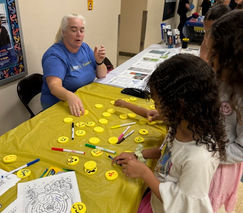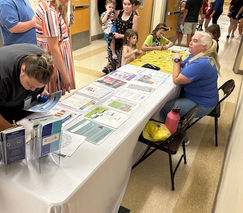Healthy Minds Program
PTAs can host virtual or in-person presentations with the "PTA Connected: Empowering Families in the Digital Age." PTA Connected is a National PTA initiative designed to help families navigate the digital world safely and effectively. It provides resources, workshops, and tools to support digital wellness, online safety, and responsible technology use. See full details on the program here. Topics Covered in PTA Connected Presentations are:
-
Digital Citizenship & Online Responsibility
-
Social Media & Cyberbullying Prevention
-
Internet Safety & Privacy Protection
-
Balancing Screen Time & Mental Wellness
-
Smart Digital Habits for Families
Jump to Articles
Healthy Minds Fair
Lake Harbor Middle School PTA, who won the LAPTA Healthy Minds Grant, had the honor of hosting their Inaugural Healthy Minds Family Engagement Fair that brought together parents and caregivers with community partners. Participants interacted with local partners, who provided valuable resources and information on important topics like internet safety, mental health, physical well-being, nutrition and more. There were 130 parents, caregivers and children in attendance from Lake Harbor Middle School, Marigny Elementary, Magnolia Trace Elementary, Fontainebleau Junior High, Fontainebleau High and Gayle Sloan Middle.
Community partners who presented were START Corporation, Beacon Behavioral Health, NAMI, Ochsner, Culinary Kids, St Tammany Healthy System and their BE WELL BUS, and the American Heart Association. The special guest speaker was Detective Brian Brown with the District Attorney’s Office Special Victims Unit. His presentation educated parents about the dangers of their children’s online use of electronic devices. This presentation was open to adults only due to the nature of the topic. Children in attendance played games during this time in a supervised environment. Raising Canes Chicken and Jeremiah’s Ice were provided to all. All participants also receive a fresh produce box from the American Heart Association and Covey Rise Farms. Lake Harbor Middle School PTA received great positive feedback from the event and they were thankful for grant funding from LAPTA to provide this important event for LHMS families and surrounding schools.
2023-24 LAPTA Healthy Minds Grant Winners

The LAPTA Board of Directors is proud to announce the LAPTA $750 Mental Health Grant winners for 2023-24 to host a program or event that prioritizes mental health for their students or community. Congratulations to our four winners: Abita Springs Middle PTA in Abita Springs, Herndon Magnet PTSA in Belcher, Lake Harbor Middle PTA in Mandeville, and Shreve Island Elementary PTA in Shreveport. We are excited to see the impact of these grants on the students!
One of the 2023-24 LAPTA Healthy Minds Grant Winner was Lake Harbor Middle School PTA in Mandeville. With their grant money, they hosted the Lake Harbor PTA Mindfulness Day. The event included a Joy Jar Station, Silent Disco, yoga, Make-Your-Own Healthy Snack Station, and Gratitude Rock Painting Station. The personalized, colorful rocks were spread throughout the campus gardens. It was such a success that they plan to continue it annually. Everyone truly enjoyed the day! If you have questions, reach out to pta.lakeharbor@gmail.com.






Healthy Minds Resources
Life is full of ups and downs. It is normal for our emotional state to change on a day-to-day basis and in periods throughout our lives. When our minds are healthy and strong, we are more resilient to life’s challenges, able to use healthy coping methods, have better relationships, and maintain our overall health and well-being. That’s why it is important to be proactive about our mental health! National PTA has developed the PTA Healthy Minds Program to help families make mental health an everyday priority. Check out the resources on this webpage, including informational and activity resources directly for families and resources to help PTAs run PTA Healthy Minds programming. https://www.pta.org/home/programs/Healthy-Lifestyles/mental-health

We live in a world where physical and mental health are not treated the same. Where we know exactly what to do if our child breaks an arm or gets the flu. But watching a child endure a panic attack or struggle with the effects of stress leave us feeling completely helpless. We don’t learn coping skills & breathing exercises until there’s a concern, or even an emergency. And sometimes, it even feels a little too late. Its time to reshape our children’s future. That's where we come in. Visit https://kidsmentalhealthfoundation.org/.
The families and members of NAMI Louisiana are here to help! We offer understanding to anyone concerned about mental illnesses and the treatment of mental illness. Mental illnesses are brain disorders that are biologically based medical problems. Untreated, they can cause severe disturbances in thinking, feeling and relating. This results in substantially diminished capacity for dealing with the ordinary demands of life. Mental illness can affect persons of any age and occur in any family. They are not caused by bad parenting and not evidence of weakness of character. https://namilouisiana.org/about-nami-louisiana/
NAMI Resources
Back to School: 7 Essential Mental Health Tips for Parents and Teachers
By Jessica Latin, LAPTA Healthy Minds Champion

With the approach of the new school year in Louisiana, prioritizing mental health is crucial for both parents and teachers. The shift from summer break to a structured academic routine can be both thrilling and demanding for children and adults. To support mental well-being and foster a supportive atmosphere, here are some actionable tips for students and educators.
1. Establish a Routine
A consistent routine can provide a sense of security and stability. For children, knowing what to expect each day helps reduce anxiety and stress. Parents and teachers can work together to establish clear schedules for schoolwork, extracurricular activities, and downtime. Start the school year with a gradual adjustment to the routine to ease the transition.
2. Encourage Open Communication
Creating a safe space for open dialogue is crucial. Encourage students to express their feelings and concerns. Teachers can foster this environment by incorporating regular check-ins and discussions about emotions. Parents can do the same at home, making sure their children feel heard and supported. Remember, it’s important to listen without judgment.
3. Promote Healthy Habits
Good physical health is closely linked to mental well-being. Encourage healthy habits such as balanced nutrition, regular physical activity, and sufficient sleep. Teachers can integrate short breaks and physical activities into the school day, while parents can establish consistent sleep routines and nutritious meal planning at home.
4. Provide Supportive Resources
Access to mental health resources is vital. PTA.org/HealthyMinds offers a wealth of information and tools to support mental health in schools and at home. It includes resources on recognizing mental health issues, strategies for creating a supportive classroom environment, and tips for involving parents in mental health initiatives. Check out the website for valuable insights and practical guides.
5. Focus on Positive Relationships
Strong relationships are the foundation of a supportive learning environment. Teachers can build rapport with students through empathy, encouragement, and respect. Parents can strengthen bonds with their children by spending quality time together and showing genuine interest in their lives. Positive relationships help build resilience and emotional well-being.
6. Stay Informed and Seek Help When Needed
Awareness is key to addressing mental health challenges. Stay informed about signs of mental health issues and don’t hesitate to seek help. Schools should have access to mental health professionals, and parents should be aware of community resources and counseling services. Early intervention can make a significant difference in a child’s well-being.
7. Practice Self-Care
Both parents and teachers need to take care of their mental health. Set aside time for self-care activities that recharge your batteries, whether it’s reading, walking, or simply relaxing. Model healthy habits for children and show them that taking care of one’s mental health is important.
As we step into the new school year, let’s commit to fostering an environment where mental health is prioritized. Together, we can create a supportive and empowering atmosphere for our children and ourselves. Here’s to a successful and mentally healthy school year ahead!
Students with Anxiety and OCD
Getting back into the routine of school can challenge students in many ways, especially for children with anxiety and OCD. Here are some resources from AnxietyTraining.com that can help.
-
"A School Counselor Can Be a Great Ally for Children with Anxiety and OCD" highlights the importance of the school counselor and provides helpful tips on how parents can fully utilize the counselor to support their child at school.
-
"Tips for Teachers to Support Students with School Anxiety" provides insights and tools for teachers to use in the classroom to support students experiencing school-related anxiety.
-
"Returning to School: How to Handle Uncertainty and Fear" provides helpful strategies for parents of anxious students on how to support the management of uncertainty and fear as they return to school.
-
"Helping Your Anxious Child Navigate Back to School with Confidence" is a great resource for parents who want to help their child feel more confident as they prepare to go back to school.
There are two resource guidebooks with parent strategies or teacher strategies that provide practical tips, activities, and support for students experiencing anxiety and stress.
Navigating the Waves of Test Anxiety:
A Guide for Students and Families
Test anxiety is a common challenge that students across different grade levels face. From elementary school to high school, the pressure to perform well on exams can manifest in various ways. It's essential for families to recognize the signs, understand the symptoms, and implement strategies to help students overcome these hurdles.
Elementary School: Laying the Foundation
In the early years, signs of test anxiety in elementary students may include restlessness, stomachaches, or a reluctance to attend school on test days. Parents can foster a positive attitude toward learning by creating a supportive environment, maintaining open communication, and introducing simple relaxation techniques.
Middle School: Navigating the Middle Ground
As students transition to middle school, test anxiety may intensify. Symptoms might include increased self-doubt, perfectionism, or trouble concentrating. Encouraging time management skills, establishing regular study routines, and promoting a growth mindset can help middle schoolers build resilience in the face of academic challenges.
High School: Facing the Summit
In high school, the stakes may feel higher, and the symptoms of test anxiety can become more pronounced. Students might experience sleep disturbances, heightened stress levels, or avoidance behaviors. It's crucial for families to emphasize self-care, encourage realistic goal-setting, and provide access to additional academic support if necessary.
Tips for Students and Families:
1. Open Communication: Encourage open discussions about academic pressures and emotions.
2. Healthy Habits: Prioritize adequate sleep, nutrition, and physical activity to support overall well-being.
3. Mindfulness Techniques: Teach relaxation exercises, deep breathing, or meditation to help manage stress.
4. Effective Study Strategies: Foster effective study habits, such as breaking down tasks and setting achievable goals.
5. Professional Help: If anxiety persists, consider seeking support from a mental health professional.
While these tips can be beneficial, it's essential for families to recognize when test anxiety becomes overwhelming. Seeking professional mental health help is a proactive step towards addressing and managing these challenges effectively. Mental health professionals can provide personalized strategies and support to help students navigate the academic journey with confidence.
Remember, addressing test anxiety is a collaborative effort involving students, families, and educators working together to create a positive and supportive learning environment. Click the link for the LEAP TO CONFIDENCE worksheet to assist with coping with testing anxiety for the upcoming LEAP tests and beyond! Happy Testing!
- Jessica Latin, PTA Healthy Minds State Champion for Louisiana
Finding Balance:
Electronics, Mental Health, and Summer Fun!
Jessica Latin was thrilled to have the opportunity to speak to the bright minds at Forest Hill Elementary about PTA Healthy Minds and the importance of balancing electronics and mental health during the upcoming summer break! It's crucial for students to find that healthy balance between screen time and outdoor activities to nurture their well-being. Their engagement and thoughtful questions were truly inspirational. Here's to a summer filled with sunshine, adventures, and mindful tech use!
Resources:
Healthy Minds: https://www.pta.org/.../Healthy-Lifestyles/mental-health
PTA Connected: https://www.pta.org/home/programs/connected
#MentalHealthAwareness #TechBalance #SummerFun #HealthyMinds #HealthyMindsStateChampion #PTAConnected #PTA #LAPTA



















































